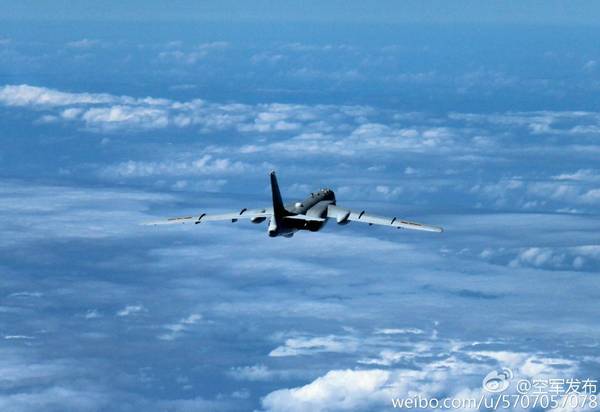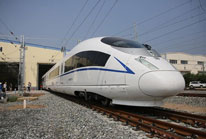

China’s drills reflect growing military capability

South Korean media may have misinterpreted the recent entry of Chinese military planes into the overlapping areas of the two countries' air defense identification zones (ADIZ) as part of China's drills in the Sea of Japan, experts said.
But they added the long-distance drills near South Korea's and Japan's sensitive locations reflect the Chinese military's growing capabilities.
The Chinese military's official newspaper, the PLA Daily, reported on Saturday that Chinese bomber jets flew over the Sea of Japan to join drills with two Chinese fleets on Friday.
The Yonhap News Agency reported Monday that three Chinese military aircraft flew over the airspace near South Korea's southern island of Jeju on Thursday without prior notice, and left shortly after the South Korean military issued a warning and sent fighter jets to escort them.
The Japanese Defense Ministry also reported on Friday that the country's Self-Defense Force also detected two H-6 bombers and one Y-8 early warning aircraft over the East China Sea and the Sea of Japan.
Yonhap said China is "flexing its muscles" in order to express its discontent with Seoul's recent decision to deploy the US missile defense system, the Terminal High Altitude Area Defense (THAAD), on its soil.
Liaoning Academy of Social Sciences research fellow Lü Chao said it was not the first time Chinese military planes flew over the area, and the earlier fly-by did not create much concern from Seoul.
However, the timing of the South Korean media reports was also interesting, he told the Global Times.
"The fly-by of Chinese military aircraft took place on Thursday, but the South Korean military did not release the information to the media until Monday, when US-South Korea military drills started. Was it because of the US backing?" Lü asked.
A Yonhap report on February 2 said two Chinese fighter jets also flew into the overlapping ADIZ of China and South Korea on January 31, and the South Korean military said it did not feel threatened by the Chinese fighter jets' presence.
"But South Korea should not exaggerate the Chinese planes' fly-by to avoid ties from becoming more tense," Lü said.
Sensitive location
Beijing-based military expert Song Zhongping said Japan and South Korea reacted because China picked a sensitive location.
Song said China was trying to use the bomber jets to tell South Korea that apart from launching missiles from China's territory, China can also send bombers with cruise missiles to airspace near South Korea, so the THAAD cannot protect South Korea at all.
An anonymous Chinese military expert told the Global Times that the Chinese military was doing the right thing if Japan and South Korea believe it was sending a strong signal, because the negative behavior of Japan and South Korea is harming their relations with China.
He said that the dispute with Japan in the East China Sea and the THAAD issue affect China's national security, and that the fly-by is the Chinese military's duty, "so if we have power we should show it to countries which threaten our security."
He added that Japan and South Korea should get used to China's military presence in the area, even in the overlapping ADIZ, because "in order to protect China's national interests, military drills in these areas will become routine, and our aircraft did not fly into any country's airspace."
Another Chinese military expert who also requested anonymity said that because THAAD affects China's security, it should focus on its military.
"THAAD is a military issue rather than a trade or cultural dispute, so China's response doesn't need to affect trade ties and cultural exchanges since it hurts both China and South Korea," he told the Global Times.
However, the impact on China will be much smaller than on South Korea if the THAAD issue interrupts bilateral trade and cultural exchanges, he said. "Only those living in Northeast China would feel the impact, but the impact on South Korea could be more significant since South Korea's economy is heavily dependent on the Chinese market," he added.
 World's fastest bullet train to start operating next month
World's fastest bullet train to start operating next month Huangluo: China's 'long hair village'
Huangluo: China's 'long hair village' Spectacular bridge with one of the tallest piers in the world
Spectacular bridge with one of the tallest piers in the world Magnificent view of Hukou Waterfall
Magnificent view of Hukou Waterfall A glimpse of Stride 2016 Zhurihe B military drill
A glimpse of Stride 2016 Zhurihe B military drill US Navy chief tours Liaoning aircraft carrier
US Navy chief tours Liaoning aircraft carrier Chinese American woman wins Miss Michigan
Chinese American woman wins Miss Michigan Centenarian couple takes first wedding photos
Centenarian couple takes first wedding photos Traditional Tibetan costumes presented during fashion show
Traditional Tibetan costumes presented during fashion show Top 10 livable Chinese cities
Top 10 livable Chinese cities Top 20 hottest women in the world in 2014
Top 20 hottest women in the world in 2014 Top 10 hardest languages to learn
Top 10 hardest languages to learn China’s Top 10 Unique Bridges, Highways and Roads
China’s Top 10 Unique Bridges, Highways and Roads Chinese athletes switch nationality for opportunities, welfare
Chinese athletes switch nationality for opportunities, welfare With another Olympic gold, Lang Ping rekindles national pride
With another Olympic gold, Lang Ping rekindles national pride Who holds the purse strings?
Who holds the purse strings? Chinese author Hao Jingfang wins Hugo Award for Best Novelette with ‘Folding Beijing’
Chinese author Hao Jingfang wins Hugo Award for Best Novelette with ‘Folding Beijing’Day|Week